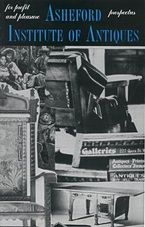|
According To One Expert It's Already A Fait Accompli  Will New Tools Help Us Learn More? Will New Tools Help Us Learn More? New York - While tech giants and government officials may currently be debating Artificial Intelligence's (AI) largescale use and application amongst the world's citizenry, for people like Cameron Newley, it's AI's influence on smaller more niche related industries, such as the decorative arts, that has him contemplating some potentially significant marketplace changes that could result from this evolving technology. As a longtime researcher and technical collaborator who's worked within the field of Artificial Intelligence for over ten years, Newley says he has a unique perspective on how this burgeoning technology may end up affecting the antique and vintage community in years to come. While his area of academic credentials upon first glance may appear to lie in more scientific pursuits, Newley acknowledges that his real joy and passion comes from collecting and selling antiques; especially Victorian oils and watercolors along with early Art Nouveau posters. "I'm a collector at heart," he says, "my family was in the business, so dabbling in antiques and selling on-the-side has always come naturally to me." However, Newley also concedes that he's put some considerable time into analyzing the potential relationship between AI and the decorative arts over the past few years, as a natural twinning of his professional and personal interests. "There's no question that Artificial Intelligence is going to revolutionize the antique and vintage industry in various ways," says Newley, "from reshaping the way collectors, sellers, and enthusiasts interact with historical artifacts, to profound effects impacting authenticity assessments, pricing, market accessibility, and even conservation efforts." One of the most significant impacts of AI that's going to happen within the antique and vintage community says Newley, is likely to be its role in authenticity assessments. "AI-powered tools and machine learning algorithms can now analyze images, historical data, and item descriptions to identify genuine pieces from reproductions or fakes." Newley believes this will help collectors and sellers make more informed decisions, reducing the risk of purchasing counterfeit items. "AI can detect subtle details that are difficult for the human eye to discern," he says, "such as variations in brush strokes on a painting or the intricacies of a piece of antique jewelry." As a result of these advanced algorithms, Newley thinks it will eventually make the antique and vintage market a more trustworthy and secure space from which to conduct business. Another consideration that Newley believes will factor heavily into AI's future role within the decorative arts market relates to pricing. For many in the industry, including himself, putting a price on antique and vintage items has always been somewhat of a challenging task, influenced by factors such as rarity, condition, and historical significance. However, Newley notes that the latest AI algorithms can now process vast amounts of historical sales data and market trends to provide more accurate pricing recommendations almost immediately. "Collectors and sellers will be able to leverage AI-powered pricing tools to determine fair market values and set competitive prices for their items." he says. "This will not only benefit individual buyers and sellers but should also contribute to the overall transparency and efficiency of antique and vintage markets in general."  AI Enhanced Personal Recommendations AI Enhanced Personal Recommendations Another interesting facet that Newley revealed from some of his latest research was the improved online market accessibility related to searching for various genres or items grouped under the general decorative arts heading. "Online platforms and marketplaces use AI to curate personalized recommendations for collectors, suggesting items that match their interests and preferences," he says, "These recommendations are based on a user's search history, previous purchases, and browsing behavior." All of which, according to Newley, when aggregated together, and then applied using a new set of algorithms, have enhanced most users overall browsing experience, making it easier for collectors to discover new items and expand their collections. However, it's not just the browsers that are advancing says Newley, while most of us are familiar (and quite likely frustrated) by online Chatbots that promise to help in lieu of an actual person, Newley says that those days of souless-conversation boxes will likely be coming to an end shortly, as the latest batch of online Chatbots are now being heavily infused with AI abilities, making them much more than just a customer support automaton. "AI-driven chatbots and virtual assistants are increasingly being used to provide detailed and complex answers to customers," says Newley. "These AI-powered tools will be able to assist potential buyers in their inquiries, offer historical context about antique pieces, and even provide information on similar items that may be of interest." Newley feels that this will inevitably make the antique and vintage market more accessible to a wider range of potential buyers who may not have had any previous or specialized knowledge in the field. "It's a way to give customers a lot more instant, and in-depth information related to a pre-purchase than they ever had before" he says. Finally, Newley believes that conservation efforts within the antique and vintage industry will also benefit from AI technology, as it will be able to assist in the restoration and preservation of historical artifacts. For example, AI-powered image recognition will help conservators identify damaged areas in paintings or sculptures and suggest appropriate restoration techniques. Additionally, AI can also aid in the analysis of materials, helping to determine their age and origin, which Newley says is crucial for preservation efforts. However, while AI brings numerous advantages to the antique and vintage landscape, it also raises some challenges and concerns, says Newley. "The overreliance on AI for authenticity assessments, pricing, and market recommendations may lead to a reduction in human expertise and judgment" he says. "Collectors and sellers need to be cautious and continue to value the insights of accredited experts within the field." Additionally, Newley believes that there are also some privacy and ethical considerations surrounding the use of AI within the decorative arts community. The collection and analysis of user data to make personalized recommendations raises questions about data security and consent. "It's essential for companies to address these concerns," he says, "to ensure that the use of AI technology is being implemented in a responsible way." In the end, Newley believes that Artificial Intelligence is likely to have a profound and lasting effect on the antique and vintage industry; impacting authenticity assessments and pricing, along with marketplace accessibility and conservation efforts. While Newley feels that these changes will no doubt enhance the overall efficiency and accessibility of the antique market in the long-run, he also acknowledges that it's likely to bring challenges related to human expertise and ethical considerations. "We have to be mindful of the fact that just as Artificial Intelligence is going to evolve, so must we in the decorative arts as well." - A.I.A. Staff Writers  NOTE: For readers seeking more information about the Asheford Institute Of Antiques distance-learning program on professional-level appraising, the study of antiques, collectibles, vintage and mid-century modern, please click here to visit the school's Home Page. Should you have additional questions about the Asheford program, you can also write to the school at: info@asheford.com or call the Registrar's Office toll-free at: 1-877-444-4508. Comments are closed.
|
AIA StaffWe're providing our students and reader's with the latest breaking news on events and happenings that we think might be of interest to both collectors and dealers alike. Including changes within the world of antiques, vintage, collectibles and appraising that might just have an effect on your bottom line. We're also interested in hearing from you - so if you've got a great newsworthy story, let us know, and you just might find it here! Archives
July 2024
CategoriesLegal Disclaimer: Extraneous opinions, statements and comments made by individuals represented within these posts do not necessarily reflect those of the Institute. The publication naming of specific business entities, organizations, and concerns, contained herein, in no way represents an endorsement or recommendation of services or products by the Institute. Publicly identifiable information contained herein (including, but not limited to contact information), has been intentionally limited where possible, due to privacy and legal concerns related to the digital dissemination of information through online means. All views expressed herein are those of their respective owners. The Institute is in no way responsible, financially or otherwise, for the accuracy or validity of statements contained within published posts from sources that originate and appear outside of the written and expressed views of those submitted by the Institute.
|



 RSS Feed
RSS Feed




